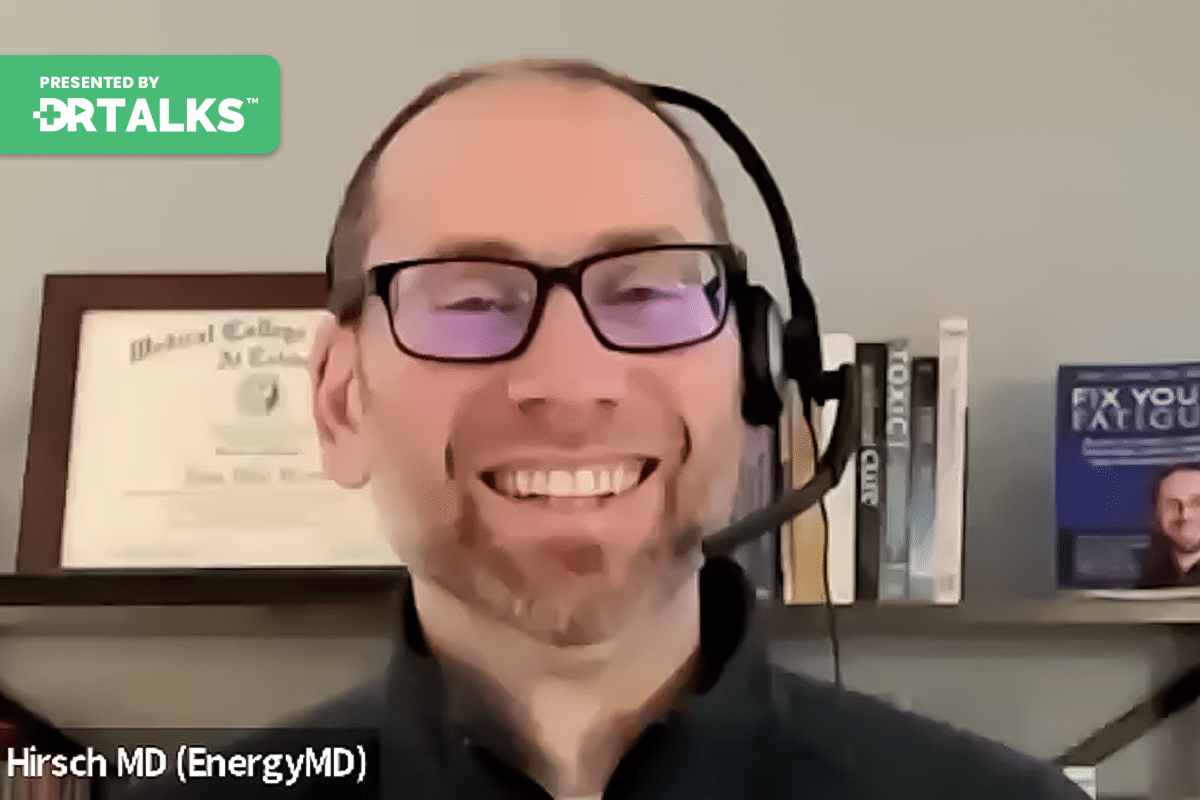Join the discussion below

Dr. Jenny Pfleghaar is a double board certified physician in Emergency Medicine and Integrative Medicine. She graduated from Lake Erie College of Osteopathic Medicine. She is the author of Eat. Sleep. Move. Breath. A Beginner's Guide to Living A Healthy Lifestyle. Dr. Jen is a board member for the Invisible... Read More

Kevin Conners, DPSc, FICT, FAARFM
Dr. Kevin Conners is the Clinic Director at Conners Clinic, an Alternative Cancer Treatment center. He graduated with his doctorate from Northwestern Health Sciences University in 1986 and has been studying alternative cancer care for over 23 years. He also holds AMA Fellowships and Board Certifications in Anti-Aging Medicine, Regenerative... Read More
- Understand the role of dietary peptides in Hashimoto’s disease
- Learn about the concept of molecular mimicry and how it relates to Hashimoto’s
- Know the importance and process of antibody testing in managing Hashimoto’s
Related Topics
Autoimmune Disease, Diet, Dietary Peptides, Gut Health, Hashimotos, Inflammation, Leaky Gut, Peptides, ThyroidJen Pfleghaar, DO, FACEP
Hello. Welcome back. It’s Dr. Jen, your host for the summit. So today’s going to be a really interesting topic with Dr. Kevin Conners. He is the clinical director at the Conners Clinic and it’s an alternative cancer coaching center. And we’re going to dove deep into the role of dietary peptides, antibodies and molecular mimicry and Hashimoto’s disease. So this is going to be a talk that you’ll probably have to listen to a couple of times because we’re going to talk about some big words and concepts, but no one better to explain than Dr. Conners. So welcome, Dr. Conners. We would love to hear about your clinic and the things you’re doing right now.
Kevin Conners, DPSc, FICT, FAARFM
Well, thank you, Dr. Jen. We are made Laci, our cancer patients. That’s our main focus that really has us focused. We have courses on autoimmune disease. And, you know, Baylor, because I dealt with those things myself in the past, I’m a lot older than you, and I’ve been doing this for a long time. So I wrote a book about automobile disease out of about 15, 20 years ago or something. So I saw a lot of autoimmune patients for a while, but God just kept sending us more and more cancer patients and with our work with frequency healing and it arrived that it just pushed us down that pathway. So mainly our focus is helping people with a cancer diagnosis, but we just try to help as many people as we possibly can.
Jen Pfleghaar, DO, FACEP
That’s amazing. And it’s so needed. And I love that you kind of listen to that voice telling you that this is the path you need to take. I know that I’ve had to do that, too. And whether my husband liked it or agreed with it too, because it’s not always easy to take the road less traveled. Right?
Kevin Conners, DPSc, FICT, FAARFM
Right. It is. That’s exactly right. Sometimes it’s a battle.
Jen Pfleghaar, DO, FACEP
Yeah, but you’re helping so many people, so that’s amazing. So let’s dove in a little bit. So, Dr. Conners, you have kind of said in the past and, you know, on your websites and stuff, that dietary peptides, they can play a role in different diseases, including Hashimoto’s. Can you explain that a little bit to our listeners for sure?
Kevin Conners, DPSc, FICT, FAARFM
For your listeners they probably understand with this when somebody says dietary peptides, but peptides are portions of proteins. So a protein is a long chain of amino acids. That’s what a protein is. And it breaks down into pieces and pieces of a protein. Still long chain amino acids are called peptides and when we eat protein, whether you ate or what source it is, our digestive process is meant to break that protein down into single amino acids or or two amino acids combine together, which is called a DI peptide. And that’s the size that we’re supposed to absorb across our gut wall. So we eat a piece of meat, our hydrochloric acid in our stomach. There are enzymes produced by the pancreas secreted into the small intestine. Do their job like little scissors breaking up this chain of amino acids and breaks it up at a smaller and smaller and smaller pieces until it gets to that single amino acid. Now, it’s not so meat anymore. It’s a libido acid or two amino acids combined together. And that that crosses the gut wall at our body uses those amino acids and peptides to make all sorts of things, including muscles that included enzymes and other all sorts of things that our body needs. The problem is that we can have damage to gut walls. So instead of it only fitting a single libido, acid or or two amino acids, it fits larger peptides. Because of that damage, that wall is broken.
And if you can think of it just like a head style with a big hole in it, now things fit through that fence that should never have been through, that fails. And now you get things going into the bloodstream that are maybe a 15 che peptide, maybe a 23 che peptide, and then our immune system looks at that as like, what in the world is that we need to kill that thing and that’s what our immune system is supposed to do, is supposed to look at enemies that get into our bloodstream or into the spaces between the cells and identify them as enemies and kill them. So are bad systems, you know, processes to kill pathogens, organisms like viruses or fungi or bacteria. But if it’s a peptide, maybe a long chain amino acid that is never supposed to be there in the first place, your immune system is going to react to that thing to try to kill it. So start living. It’s not going to die. So you can end up developing it over time, but your immune system is trying to kill it. And then this whole process through renewed stimulation, your one system fires to try to kill it. Those are your killer cells and it doesn’t kill it.
Eventually you could end up with a B cell reaction that creates antibodies against that which the th1 side of the immune system was trying to kill. So you could create antibodies against these peptides, which is crazy thing. We’re never supposed to create antibodies against food peptides. And then when you create antibodies against peptides, you just create this ramped up inflammatory process. Then it gets just worse from there. Because now every time you eat meat and you break down these peptides, there’s protein in other things too. But when you whether your body are circulating antibodies because you have antibodies now created against that peptide that is circulating in your bloodstream, circulating in your extracellular space, but it’s also secreted into the little bit of your gut. So when you eat that food again and it breaks down to that 15 peptide and you have antibodies to that 15 chain peptide, you’re going to create this inflammatory response in the gut as well. So that 15 jade antibody and you’ve got this ramped up inflammation, so you just create this, it’s a negative cycle that you create this ramped up inflammation. So that’s what we’re looking at. When you look at any of with any autoimmune response, you’ve got to look at, okay, an autoimmune response is your listeners have been watching the series is that your body is making antibodies to self tissue. Well, that’s bad. That’s really bad. But any time you have ramped up inflammation anywhere in the body inflammation, is it immune response? You are going to kill that which you have antibodies against first and if you have antibodies to self tissue and you’re eating a food or you have antibodies to that peptide, you’re going to ramp up immune response. And by doing so, you’re going to do more damage to the organ that you have antibodies against as well.
So in the case of Hashimoto’s, you have antibodies to your thyroid gland and let’s say you’re eating the food that you have created antibodies against through the process that I just explained briefly that when you eat that food, you have this inflammatory response in the gut, that inflammatory response systemically, and that inflammatory response is an immune response. And that immune response that will kill that what you have antibodies against. And if you have antibodies to your thyroid, you’re going to do damage to your thyroid. That’s why to eat a food that you have antibodies to causes inflammation in your gut and maybe you’re got a really high paid tolerance and you don’t feel any gut inflammation and it doesn’t bother you. That’s okay. It’s just a little that pain that I take. So we observe that it goes away. Well, you are damaged. You are killing thyroid tissue every time you do that. And when you kill thyroid tissue, you either damage the thyroid, which could be permanent and even worse, you you can liberate excess T4, T3, you could end up with, you know, a decreased thyroid production. Because of that, you could increase and add up with an increased thyroid production because of that, you can push things to reverse T3. All sorts of negative cycle things can happen.
Jen Pfleghaar, DO, FACEP
Yeah, and I think that’s a great point. I love how you laid that out is every time you go back and eat that food that you were sensitive to and it might just feel like a little ache in your joints, but you’re doing long term damage and possibly for the thyroid irreversible. And I’ll have a lot of patients. They’re like, Can I get off thyroid med? If I fix my gut health? And I’m like, it depends on how much damage was done in the first place. Because if that damage occurred sometimes, you know, we can’t, we can’t reverse it. So really paying attention to your body. And that’s why a lot of these elimination diets are helpful. Gluten or wheat. I have all my patients off that. It’s just highly reactive. And then there’s the glyphosate that damages the gut. So you know, if that makes sense too to our listeners out there, you know, I always go, you know, show the hands of like the leaky gut, you know, things are coming through that shouldn’t our gut should just be a little bit permeable to the little things. So I think it’s a concept that’s becoming more mainstream, which is good, but, but we still I mean, how many people do you think are just walking around with leaky guts? Probably, I would say like 80 to 90%, right?
Kevin Conners, DPSc, FICT, FAARFM
Well, I would say, yeah, probably closer to 100% of people have some damage in their gut. Right. And the reason is, is. Well, why is that? Well, that’s because of number one is medication use of glyphosate. So even if you’re like, oh, my gosh, I don’t have any glyphosate because I eat organic. All right. You still have high glyphosate content to your food that’s cross contaminated no matter what you do. It’s not about like I got to remember that glyphosate said my diet. Okay, well, good luck with that. We should all try to eliminate glyphosate in your diet, but we have to be realists too, that we are constantly doing damage to our gut. I think that sometimes practitioners have a misnomer to think that, okay, we’re going to heal your gut and this is going to solve your problem. You have to constantly be working on healing your gut. It doesn’t stop. You don’t do a gut feeling protocol it about it’s healed because you’re damaged to get already, you know.
So it’s just it’s got to be lifestyle changes and you have to be just aware of that. And same thing with the food peptides. It’s like you have to test for these things and see what is going on. You know, I’ve seen so many people that just can’t seem to get a hold of their autoimmune disease and it continues to, you know, cycle downwards. And some of those people, you know, no matter what you do, you still can’t, you know, get them off of that downward slope. But you could do a lot of help by looking at these lifestyle things. You got to look at other immune triggers. The majority of people that have an autoimmune disease that know they have an autoimmune disease probably have antibodies to other self tissue as well that they aren’t aware of. That may still be a you know, there’s three phases of autoimmune disease that might still be in a phase one, they have antibodies, but they don’t have any symptoms yet or any tissue damage. But it’s something to look at and to take a deeper look at because some people may be, oh, I got it bandaged, I’m taking synthroid and I feel just fine. But if you don’t it’s going to just continue to progress if you don’t look at these other aspects.
Jen Pfleghaar, DO, FACEP
Yeah, and that’s a great point. And when I was diagnosed with Hashimoto’s in medical school, I was told that there is nothing I could do and my thyroid would just eventually die. And that’s just so inappropriate, you know, and endocrinologists are still saying that. And, you know, I like what you said. You’re always working on your gut health. And I think that’s a great point. I tell my patients that I’m always working on my gut health. You know, when I talk about it on my Instagram, it’s so true. It’s always a work in progress. And you could go out to dinner and get food poisoning and then you have to work on it again, right? So you’re always kind of tweaking things. And I have tested glyphosate levels in patients that have ate the cleanest organic. But it’s everywhere. It’s in our rain. I mean, if maybe if we moved out of the United States, I mean, I wonder in Europe, you know, testing, they probably don’t have as much of it in the environment. But like you said, cross-contamination and everything, glyphosate, it’s a really tough molecule. It’s so frustrating.
Kevin Conners, DPSc, FICT, FAARFM
It is. And I would agree with Europe, there’s they have bad debt for decades. It you know, there’s areas that are probably fairly clean. There’s Delaware or the U.S. or Canada that you could get clean that were truly clean food. You would if you grow it, it yourself, it’s it is carried everywhere from everywhere.
Jen Pfleghaar, DO, FACEP
Yeah. Well, let’s jump in to talking about molecular mimicry. So what exactly is it? It’s kind of a big fun term, but it makes so much sense. And how does this influence autoimmune disorders?
Kevin Conners, DPSc, FICT, FAARFM
So molecular mimicry is just concept that if you have antibodies to something, there’s other things that those antibodies will also attach to. So antibodies aren’t perfect in their specificity. So and that’s a good thing. So let’s say if I’m exposed to assertive variety of strep, right, and I get sick and I have a little sore throat, I don’t feel good. I just work for a couple of days. Well, that’s an indication that my immune system went through and had an immediate immune response or what could be called a t h response to try to kill this organism. Was it able to b sell your th2 response fired and started to make antibodies against it. So now I have antibodies circulated to my body against that specific strain of strep. Now the nice thing about, you know, not perfect specificity is that let’s say I was six months later, I’m exposed to a different variety of strep. So, you know, by I that it enters into my body, let’s say through my lungs, it gets into my bloodstream while I have those other circulating antibodies and that will that bind to that strep virus right away. And thereby immune system will immediately recognize that and fire a response and kill it or that I don’t ever feel sick. And then at that I have all these circulating antibodies to strep and then my kids get sick and I don’t get sick. And, you know, I’m around people at work all the time and I don’t get sick. And that’s what is the definition of a healthy immune system. I have a lot of different antibodies to a lot of different pathogens. That’s why Bubs tend to not get sick. Why are Bob’s healthy?
Are they’re dealing with all these sick kids all day long because they have a lot of circulate in their bodies because they’ve dealt with this. They their immune system is c this this bad guy and has made antibodies against it and it will those antibodies will work for similar bad guys to now that that’s not necessarily a good concept where do we have antibodies to self tissue so we don’t want to spark and antibody reaction to self tissue that’s that’s that’s what we want to call down. We want to use nutrients that will help stimulate t regulation side of our immune system to calm down that immune response. But we can there are certain things that are that thyroid antibodies can be mimicked with. And one of the things that you alluded to is that you have all your thyroid patients off of gluten and wheat because gluten is a molecular basically Adib is a molecular mimic to your thyroid gland. So I mean even without doing any testing whatsoever, somebody knows they have Hashimoto’s that absolutely should be gluten free. I mean we don’t even need a test. Well, why would you say that? I don’t have any problems with gluten. Well, maybe you don’t have maybe you don’t have gluten antibodies. Maybe you. Your gut is fine with gluten, but your thyroid, it’s not it’s a molecular limit to your thyroid. So there are certain things that because of the way they’re shaped, the formulation of the protein, it is another stimulated factor to the immune system. And the perfect example, as Carly added with the thyroid. So anybody with Hashimoto’s should, I should say everybody with Hashimoto’s should be off of gluten and then it goes even deeper. Yeah it’s a it’s a good to run differed test for cross contaminants as well as well to see if there’s any other foods that have cross contamination because of the molecular baby with adequate goes deeper you know with that molecular yeah but graves that’s where I highly suggest people run some tests to see where that is.
Jen Pfleghaar, DO, FACEP
Okay, so let’s talk about testing. So why is testing for antibodies important and what types of antibody testing is most important, would you say?
Kevin Conners, DPSc, FICT, FAARFM
Well, when we talk about antibody testing, that’s a broad topic because you could say we’re testing for food antibodies. So we’re tested for antibodies to different proteins, different peptides in food. And that’s really important to help heal the gut. That’s a really important to quell an immune response like I mentioned, if I have antibodies to any cell tissue, whether it’s a thyroid or anything else, and I fired immune reaction every time I eat this food well, every time I eat that food that I did, it damaged that tissue as well. But it goes deeper if you try to diagnose an autoimmune disorder, you want to know if you have self antibodies, cell, so antibodies to specific tissue. So there’s really two categories of autoimmune disease. You could have tissue specific autoimmune disease. So I just have Hashimoto’s, I just have thyroid antibodies and that’s all I have let’s say. Okay, that could be a topic of, you know, a lot of your listeners or your just a lot of listeners, but it’s always good to go, where else do I have an autoimmune disease? At least ask that question. Do I have other tissues that I develop antibodies because remember, there’re three stages of an autoimmune disease. There is a stage one which is I have antibodies to self tissue, but I don’t have any symptoms, I don’t know any tissue destruction.
And then stage two is I have antibodies to self tissue and I’m getting symptoms and that’s where a lot of people with Hashimoto’s are. You know, they started to get some tiredness and started to get symptoms of this. And then stage three is I have antibodies to self tissue, I have symptoms and now I getting more severe tissue destruction. So the case example like a really tried, you know, disease as you would have now you’d have, you know, big nodules out of the joints and very visible arthritic changes, not just joint stiffness. So it’s always best to catch that early. So it’s that should be very early in this conversation that it’s very, very common that a person has an autoimmune disorder, they have a node autoimmune disorder, I have Hashimoto’s. It’s very common that they have other tissue antibodies. So that’s the first thing to look at with antibody testing. Do I have another autoimmune disease? Is it if I start to develop antibodies to other tissues? And then there’s a second category of autoimmune disorders and that’s what’s called a systemic autoimmune disorder. And that means it’s not just to you don’t have antibodies just to a specific tissue, but you have antibodies to to that to a specific order, but antibodies to global things like DNA antibodies or that there’s tests for that. Well, you have DNA antibodies. You have this can affect any cell anywhere. So you could get strange symptoms, odd symptoms wherever there’s going to be an attack and destruction of different areas. And that becomes a much more difficult case scenario. You’re really just trying to help call that case down. And with the tissue antibodies, I want to say I do want to talk about to that second category. It’s I think it’s very valuable to read antibodies to neuronal tissue because that could be maybe that’s not a systemic autoimmune disorder, which is so debilitated. But when you have antibodies to the tissue that could be extremely debilitating, that could cause a lot of emotional grief to someone. So when I talk about neuronal antibodies, I’m talking about tissue antibodies to braid tissue. So the the reason why I could be so emotionally debilitated because people could feel like they’re going crazy and can’t get any games or so they could be going to, you know, good functional medicine doctors or they’re they’re the medical doctors within the functional medicine and they can’t seem to pinpoint why they have these crazy symptoms.
And if you don’t run neural antibody panel, you may never discover it. And if you do run that, that really helps answer a lot of questions. If you’re having a lot of other motor type symptoms which were aided by weird symptoms that could like my it could cause symptoms like my right knee is killing me today and I could hardly walk out the next day. It’s like my knee doesn’t hurt at all, and that with my left elbow is killing me, but it’s really bothering me to like brain fog type symptoms. You can’t think anymore. What’s wrong with me? I can’t remember things. Do I have Alzheimer’s? And they might even run from Alzheimer’s test. So that’s not present, but it’s neuronal antibody. So every time you did go back to our case scenario of every time you eat gluten or something, you have antibodies to in your gut, it causes inflammation there. What’s going to it’s going to cause inflammation at your brain. And now it just causes this negative cycle it more damage to your brain and that gets really scary. So running these tests, I think, can be valuable to help. If a person doesn’t have any of these weird drugs that could help go, wow, I am and have antibodies. I don’t have any symptoms there. So it maybe at a very latent phase, but now I could do things to prevent it from getting worse. And if you do have weird, crazy symptoms, it could help you to realize if those are positive, why you’re okay. I’m not going crazy. I don’t just like to get out some psychotropic medication, I need to start dealing with this. And there are ways to help manage that and to call that inflammatory process.
Jen Pfleghaar, DO, FACEP
Yeah, and especially since the pandemic, I’ve heard a rheumatologist talking about how he’s seen like all is which is an antibody. It’s nonspecific, but they’re positive and they’re like, Oh, well, it doesn’t really mean much. And no, it does, it does. It means that your body’s mad, your immune system is hyperactive and attacking your body. So, you know what can we talk about a few simple strategies. If someone does have this process going on, what can they do?
Kevin Conners, DPSc, FICT, FAARFM
Yeah. So the strategies are much lifestyle changes. So there is it really you talk about you have to do ocular antibodies, you have a systemic autoimmune disease and for a doctor to go, well, there’s not much we can do about this. I mean, this person’s body is killing itself. You have got to deal with this. This is very, very serious. So what do you do? So you have to look at doing a real proper history. What are your this person’s triggers? You know, it might be chemical triggers. You know that I could it breeds fragrances. It just makes me go crazy. Or I go to a robot, I feel like there’s a boulder. It makes me go crazy. Well, you know that they have a damaged talk about a damaged gut barrier. They probably have a damaged lung barrier that, you know, if they’re getting these weird symptoms, they have a damaged blood brain barrier. So you have to deal with these barrier issues, but you have to look at for a lifestyle perspective first. So you have to go where this person is willing to go with these things, to so clean up their lifestyle, look at their triggers that are affected up, that you have to do some testing to see.
You know, everybody’s got to eat, right? You can stay out of moldy buildings, right? Possibly. Maybe change your job situations or work from home, clean up your home. But you everybody’s got to eat. If you’re eating things that are causing a beard stimulation, well, you’re just killing your you’re never going to get better. You just constantly kill yourself. So you have to do a full antibody panel out of your food and make sure you decrease because you could do a zillion things to help heal your gut. And every time you eat something that causes a fire, you’re just damaged. What you just worked out, try to heal it. So you’ve got to figure out what is causing this fire. Get rid of that out of the diet, work of healing the barriers and look at lifestyle, things that are up, you know, help called the triggers. Make sure this person’s get enough sleep make sure that they’re doing a very moderate amount of exercise over exercise is a huge trigger for this type of thing.
And it could work. It decreases the systemic inflammation through dietary things as well. So the benefit that we had through the millions and billions of dollars that were funneled into brain inflammation and post-concussion have several studies is that we got all the benefits of all those studies. And quite interesting, the studies showed that neuronal antibodies and micro glial prided themselves that the brain the the drugs that were used, even prednisone type drugs, are not really effective. And call me that down in the studies that showed that that really the thing that was effective in that oh were nutritional flavonoids. So all the things that a natural doctor would recommend for inflammation like Kirk admitted add raspberries for all, add white willow bark and add Boswell and sticky dettol and green tea extract and things like that. Are the key things that decrease not just systemic inflammation, but specifically brain inflammation to help call that whole side down and then work on stimulated like I mentioned earlier Treg production so that it’s just carbs that have you’d response.
Jen Pfleghaar, DO, FACEP
Yeah I love it because it goes back to food being medicine and it really is amazing. Now I don’t want our listeners to be like, Oh, I can’t eat anything or I’m going to go get a food sensitivity test. Right now what I do with my patients is we work on gut health. We work out taking out any dysbiosis or bacteria or imbalance, Candida mold, anything that shouldn’t be there. And then I will later on do a food sensitivity test. I wait till we calm things down because a lot of the times I’ll see patients if they get it right away. They’re positive for everything, you know, it’s just the floodgates are open. So I don’t know if that’s if you agree with that or not, but I tend to wait. And then I also, you know, once we heal the gut, then you can start introducing some things back in. But your body will tell you. I mean, your body will let you know if you can if you’re ready for that.
Kevin Conners, DPSc, FICT, FAARFM
Yeah, I would agree. You got to do this. You not try to do this all at once. I always suggest you work at start on lifestyle things and just try to calm down, investigate your own triggers, see what triggers things. If you’re highly inflamed, you’re right. You might do you know, let’s say, Rex, tell it everything is positive or you just causes depression and just try to clean out your diet. Don’t clean out the things that you know you should be eating right off the bat, you know? And many times people just remove gluten, a dairy from their diet that carbs everything down. And now they feel like they have more energy to work on other lifestyle things. So that’s a huge piece of it all has to do with, you know, I did this for people to think that the all these tests cost money so, you know, to to educate yourself as much as possible and just make those lifestyle changes. That doesn’t cost anything. It doesn’t cost anything to start eating gluten free, a dairy free. If you don’t substitute a whole bunch of gluten free non organic junk in place of it, you’re just change your diet, you’re cleaning up your diet, start doing some fasted or you know, you know, modified type based aid and just help. That’s a huge lifestyle change you could call building inflammatory process in your body. You know, obviously, it decrease a lot of your symptoms and you don’t have to spend as much money. You notice that anybody on testing would call everything done.
Jen Pfleghaar, DO, FACEP
I agree with that. And I’ll see patients. You know, I tell them I’m like, okay, first step, we got to clean your gut. You got to go gluten free. I have them go dairy free for a couple of weeks and then I’ll say you can put it back in and you can make the decision. But for sure I have them go gluten free and I think it’s a lot more reasonable than like doing an AP diet and autoimmune inflammatory protocol like that is very overwhelming to people. And like you said, Dr. Conners like they get depressed if they can’t eat anything. So I, you know, just taking out gluten and dairy for eight weeks and then you could see how you feel. And I tell my patients, I’m like, you know, if you don’t think you feel different, add it back in and see if you get aches and pains back or a rash. But most of them, they’re like, I don’t bloat anymore. My constipation is better, my aches and pains have gone away. And, you know, as you explained earlier, the actual reasons why you’re decreasing those antibodies and we’re healing the gut and we’re making the gut strong again. So I think that, you know, you’re a lot like me where we don’t want to overwhelm our patients and clients because then that stress is going to cause more harm. So yeah, working on your sleep, making sure you’re moving every day. I mean, these are basic pillars of health that will also really help and make a difference that you set are not expensive, you know. So it’s hard it’s easy to get really overwhelmed. May be listening to this, but it’s not it’s not that hard really. Right. I mean, I don’t think it is.
Kevin Conners, DPSc, FICT, FAARFM
Well, you have to have some level of motivation to to feel better and you have to have moved out of the realm of. I just got to go to the doctor appeal that’s going to solve problems. And it gets down to personal responsibility ultimately.
Jen Pfleghaar, DO, FACEP
Absolutely. Pill for a pill does not work like working in the emergency room and having my eyes open to patients that kept coming in. They were following up with their doctors, they were taking their medications and they didn’t feel good. So, I mean, it just conventional medicine, it’s it’s good it’s good for certain things. And I love it for certain things but not for long term disease. Not for chronic disease, and especially not for autoimmune disease.
Kevin Conners, DPSc, FICT, FAARFM
So.
Jen Pfleghaar, DO, FACEP
Well, Dr. Conners, thank you so much for coming on the summit today. I would love for you to share with our audience where they can reach you and tell us a little bit more about your clinic.
Kevin Conners, DPSc, FICT, FAARFM
Yeah, you can find us at Conner’s clinic at connersclinic.com and a bunch of courses that you can take. Hopefully they’ll listen, it has cancer, but if you have loved ones that do, you can download our books for free and look at all of our stuff and certainly contact us on ways that we can help.
Jen Pfleghaar, DO, FACEP
Thank you so much. We really appreciate you being here.
Kevin Conners, DPSc, FICT, FAARFM
Well, it takes ten.
Downloads









